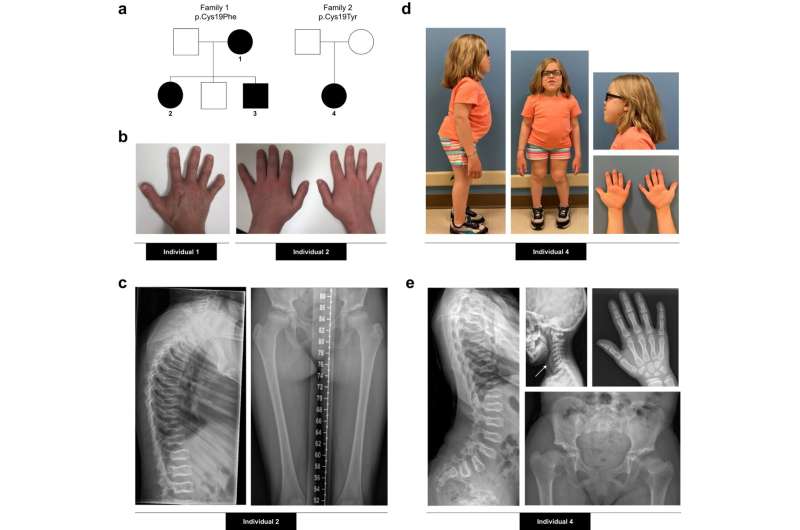
Clinical description of affected individuals from Family 1 and 2. a Pedigrees of the two affected families. Black symbols represent affected individuals. b Photographs of the hands of two individuals from Family 1 showing short hands (including short palms and brachydactyly) and brachytelephalangism. Left: Individual 1 (at 52 years of age); Right: Individual 2 (at 18 years of age). c X-rays of Individual 2 from Family 1 at 10 years of age showing diffuse platyspondyly with biconcave vertebral bodies throughout spine, flattened and broad bilateral femoral epiphysis with patchy ossification of the acetabular roof. d Photographs of Individual 4 from Family 2 at 10 years of age, showing short stature with a disproportionate short trunk, rhizomelia, exaggerated lumbar lordosis, midface retrusion, short hands with brachydactyly and mild bilateral genu valgum. e X-rays of Individual 4 from Family 2 at 7 years of age showing diffuse platyspondyly with biconcave vertebral bodies throughout spine, broad, flattened bilateral proximal femoral epiphyses, coxa vara and brachytelephalangism of the lesser fingers. X-ray of lateral cervical spine shows premature calcification of the cricoid cartilage (white arrow). Credit: Nature Communications (2023). DOI: 10.1038/s41467-023-41651-6
A McGill-led team of researchers has made an important discovery shedding light on the genetic basis of a rare skeletal disorder. The study, published in Nature Communications, reveals that a defect in a specific gene (heterozygous variants in the matrix Gla protein, or MGP) may cause a disorder that affects the structure of connective tissues that supports the body.
MGP is a special protein found in blood vessels and cartilage that helps prevent the hardening of these tissues in the body. If MGP is completely missing, it can lead to Keutel syndrome, a rare condition where tissues become calcified, causing issues in the skeleton and blood vessels.
However, in this case, the variance in the MPG gene observed by the researchers is different from Keutel syndrome in both how it shows up in people and what is happening at the cellular and molecular level.
“Our paper reports four people from two different families who had a slight change in their MGP gene. These changes made the protein a bit different, and these individuals showed a specific bone disorder,” explains Monzur Murshed, Full Professor in the Department of Medicine, Divisions of Endocrinology and Metabolism and Experimental Medicine and the Faculty of Dental Medicine and Oral Health Sciences, and senior author of the study.
After testing these genetic changes on mice to better understand the situation at the cellular and molecular levels, the researchers found that the changed MGP caused similar bone issues in both mice and humans. Unlike the normal protein, the changed protein does not go out of the cells, which in turn leads to stress in a part of the cell called the endoplasmic reticulum. Cartilage cells making the changed protein cannot cope with the stress and eventually die, causing the bone abnormalities.
A step further in understanding rare diseases
This research not only expands the understanding of the genetic factors contributing to skeletal dysplasia, but also paves the way for potential therapeutic interventions. The findings highlight the importance of the MGP gene and its role in skeletal development, providing hope for improved diagnosis and treatment of individuals affected by this rare condition.
“There are many rare diseases with similar skeletal problems. We are hopeful that if more people are familiar with our work, they may come forward to consult with the clinicians and researchers,” adds Prof. Murshed. “After the publication of our paper last month, we have been contacted by a clinician who has examined another individual with skeletal dysplasia carrying the same mutation in the MGP gene. This may help further research and also improve the treatment and management of these diseases in the long run.”
More information:
Ophélie Gourgas et al, Specific heterozygous variants in MGP lead to endoplasmic reticulum stress and cause spondyloepiphyseal dysplasia, Nature Communications (2023). DOI: 10.1038/s41467-023-41651-6
Citation:
Discovery unravels the mystery of a rare bone disease (2024, January 16)
retrieved 18 March 2024
from https://medicalxpress.com/news/2024-01-discovery-unravels-mystery-rare-bone.html
This document is subject to copyright. Apart from any fair dealing for the purpose of private study or research, no
part may be reproduced without the written permission. The content is provided for information purposes only.
Note: This article have been indexed to our site. We do not claim legitimacy, ownership or copyright of any of the content above. To see the article at original source Click Here













